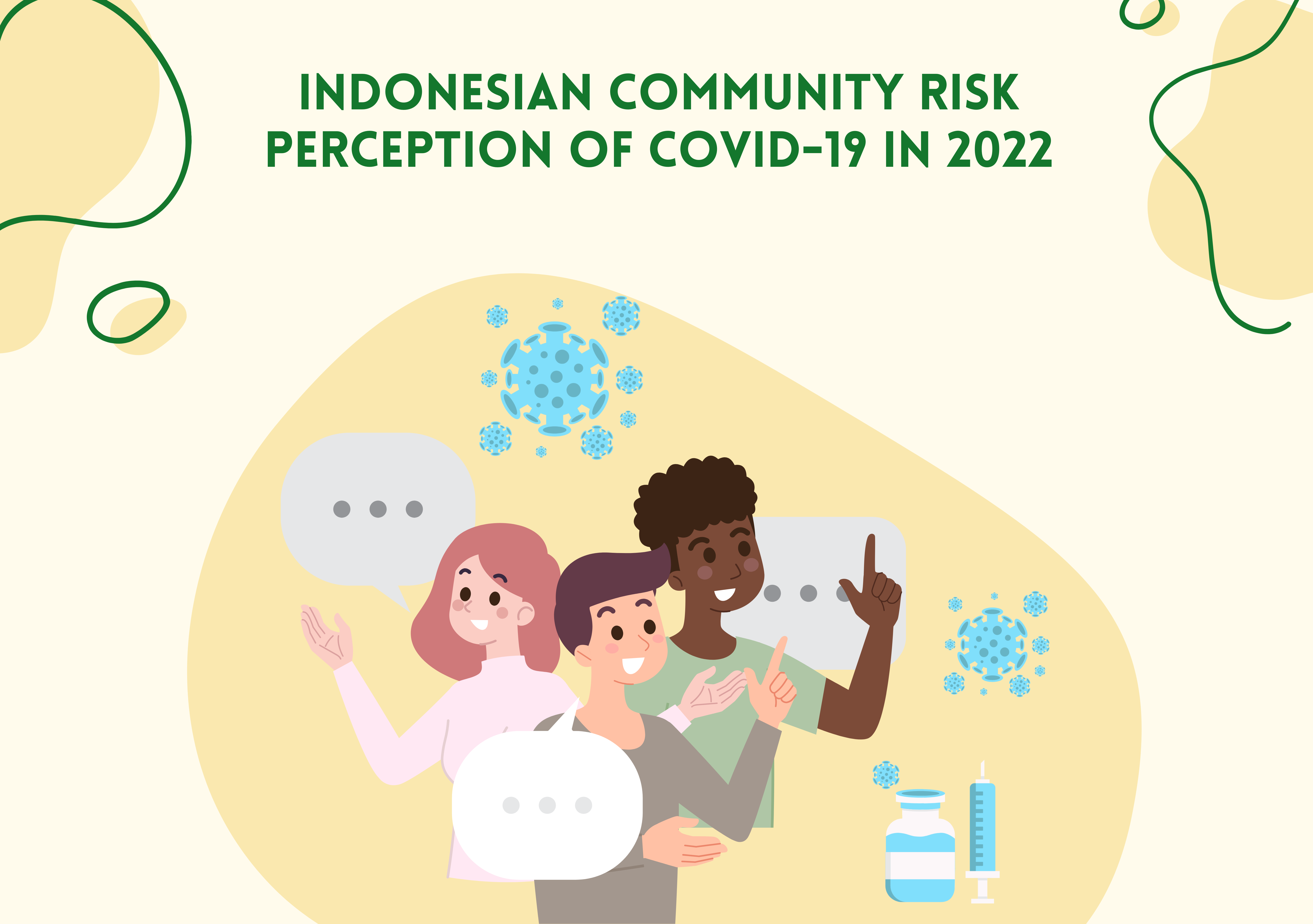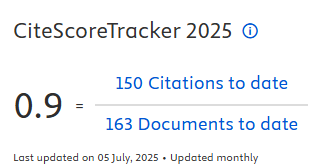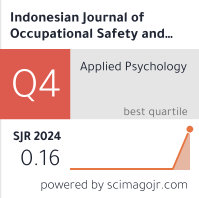Indonesian Community Risk Perception of COVID-19 in 2022

Downloads
Introduction: In line with the increasing number of COVID-19 cases from July to early August 2022, this paper aimed to analyze the perception of COVID-19 among Indonesians. Methods: A cross-sectional online study on COVID-19 risk perception was conducted in the first week of July 2022. A questionnaire adapted from ECOM (Effective Communication in Outbreak Management for Europe) was distributed online through social media to obtain information about the respondents' knowledge, behavior, and risk perceptions on COVID-19. Results: There were 775 respondents. Most of them were female (61.3%), lived in the eight most targeted areas (84.1%), were unmarried (52.5%), held a bachelor's degree (38.5%), and were Muslims (80.8%). The percentages of respondents who had been infected with COVID-19 were (43.8%). Most participants believed that their knowledge level of the disease was average and above average (>91%). Of the respondents, 83.6% perceived the seriousness of COVID-19 as serious and very serious. However, the anxiety level among these respondents was moderate (slightly and quite anxious). This indicates that even though most respondents still see COVID-19 as a serious disease, their level of fear is decreasing. Compared to a previous study, most respondents in the current study were more confident of their ability to control the risks associated with the transmission of the virus. Nevertheless, they still believe that outdoor activity and not using a face mask can significantly increase the probability of getting infected. Conclusion: The risk perception of COVID-19 in Indonesian community among our study population was appropriate.
Alkhaldi, G. et al. (2021) ‘Perceptions towards COVID-19 and Adoption of Preventive Measures among the Public in Saudi Arabia: A Cross Sectional Study', BMC Public Health, 21(1), pp. 1-21
Alreshidi, M.S. and Gonzales, F. (2021) ‘Knowledge, Attitudes, and Practices of Saudi Citizens on COVID-19 Pandemic: A Multi-region Survey', Makara Journal of Health Research, 25(3), pp. 146−152.
Anggun, W. (2021) ‘Hubungan Karakteristik Individu Dengan Pengetahuan Tentang Pencegahan Coronavirus Disease 2019 Pada Masyarakat Di Kalimantan Selatan', Jurnal Kesehatan Masyarakat, 15(1), pp. 42–46.
Badan Pusat Statistik (2021) Perilaku Masyarakat Pada Masa PPKM Darurat, Badan Pusat Statistik Republik Indonesia.
Badan Pusat Statistik (2022) Perilaku masyarakat pada masa pandemi covid-19; Hasil survei perilaku masyarakat pada masa pandemi covid-19 periode 16-25 Februari 2022, Badan Pusat Statistik Republik Indonesia.
Badan Pusat Statistik RI. (2020) Perilaku Masyarakat Di Masa Pandemi Covid-19, Perilaku Masyarakat di Masa Pandemi Covid-19 BPS RI.
Betsch, C., Wieler, L.H. and Habersaat, K. (2020) ‘Monitoring Behavioural Insights Related to COVID-19', The Lancet, 395(10232), pp. 1255-1256.
Chen, L. and Yang, X. (2019) ‘Using EPPM to Evaluate the Effectiveness of Fear Appeal Messages Across Different Media Outlets to Increase the Intention of Breast Self-Examination Among Chinese Women', Health Communication, 34(11), pp. 1369–1376.
Farhana, K. (2020) ‘Knowledge and Perception Towards Novel Coronavirus (COVID-19) in Bangladesh', SSRN Electronic Journal, 6(April), pp. 76–79.
Gaube, S., Lermer, E. and Fischer, P. (2019) ‘The Concept of Risk Perception in Health-Related Behavior Theory and Behavior Change BT - Perceived Safety: A Multidisciplinary Perspective', in M. Raue, B. Streicher, and E. Lermer (eds). Cham: Springer International Publishing, pp. 101–118.
Kwok, K.O. et al. (2020) ‘Community Responses during the Early Phase of the COVID-19 Epidemic in Hong Kong: Risk Perception, Information Exposure and Preventive measures', Emerging Infectious Diseases, 26(7), pp. 1575–1579.
Lotfi, M., Hamblin, M.R. and Rezaei, N. (2020) ‘COVID-19: Transmission, prevention, and potential therapeutic opportunities', Clinica Chimica Acta, 508(April), pp. 254–266.
Natalia, L. (2020) ‘Presiden: ibu anak warga Indonesia positif covid 19'. Jakarta: Antara.
Pinchoff, J. et al (2020) ‘Gender specific differences in COVID-19 knowledge, behavior and health effects among adolescents and young adults in Uttar Pradesh and Bihar, India', PLoS ONE, 15(12), pp. 1–13.
Sultana, M. et al. (2020) ‘Gender differences in Knowledge, Attitude and Preparedness to Respond to COVID-19 among adult population in Bangladesh: A Cross-sectional Study', Population Medicine, 4(January), pp. 1–11.
Satuan Tugas Penanganan COVID-19 (2022) SITUASI COVID-19 NASIONAL.
Schulman, J.S. (2020) ‘Coronavirus Disease Covid-19',)
Seale, H. et al. (2020) ‘COVID-19 is Rapidly Changing: Examining Public Perceptions and Behaviors in Response to this Evolving Pandemic', PLoS ONE, 15(6), pp. 1–13.
Tejamaya, M. et al. (2021) ‘Risk Perception of COVID-19 in Indonesia During the First Stage of the Pandemic', Frontiers in Public Health, 9(October), pp. 1–10.
Vai, B. et al. (2020) ‘Risk Perception and Media in Shaping Protective Behaviors: Insights From the Early Phase of COVID-19 Italian Outbreak', Frontiers in Psychology, 11, pp. 1-8.
West, R. et al. (2020) ‘Applying Principles of Behaviour Change to Reduce SARS-CoV-2 Transmission', Nature Human Behaviour, 4(5), pp. 451–459.
World Health Organization (2020) WHO Timeline - COVID-19.
World Health Organization (2020b) WHO Director-General's opening remarks at the media briefing on COVID-19.
Zhong, B.L. et al. (2020) ‘Knowledge, attitudes, and practices towards COVID-19 among Chinese Residents during the Rapid Rise Period of the COVID-19 Outbreak: A Quick Online Cross-Sectional Survey', International Journal of Biological Sciences, 16(10), pp. 1745–1752.

This work is licensed under a Creative Commons Attribution-NonCommercial-ShareAlike 4.0 International License.

In order to be accepted and published by The Indonesian Journal of Occupational Safety and Health, Author(s) who submit an article should complete all the review process. The copyright of received articles assigned to the The Indonesian Journal of Occupational Safety and Health and Department of Safety and Health, Universitas Airlangga as publishers of the journal. The intended copyright includes the rights to publish articles in various forms (including reprints).
The Editorial Team of The Indonesian Journal Of Occupational Safety and Health and Department of Safety and Health strive to ensure that no errors occur in the articles that have been published, both data errors and statements in the article.
Users of this website will be licensed to use materials from this website following the Creative Commons Attribution-NonCommercial-ShareAlike 4.0 International License. No fees charged. Please use the materials accordingly.
------------------------------------------------------------------------------------------------------------------------------------------------------------------------------------------
Attribution ” You must give appropriate credit, provide a link to the license, and indicate if changes were made. You may do so in any reasonable manner, but not in any way that suggests the licensor endorses you or your use.
NonCommercial ” You may not use the material for commercial purposes.
ShareAlike ” If you remix, transform, or build upon the material, you must distribute your contributions under the same license as the original.







 How to Submit Articles in OJS
How to Submit Articles in OJS

























